Mr. Joseph Katabarwa was until very recently Head of Environmental Health Desk, Ministry of Health in Rwanda. He is the key proponent of the CHC approach in Rwanda, responsible for building the national programme known as Community Based Environmntal Health Promotion Programme (CBEHPP). Together with the Director of Programmes, Anthony Waterkeyn, who was at the time (2009) working for WSP-World Bank, they set up the robust national programme that is now being taken seriously world wide as a change agent. With a government restructuring of the Ministry of Health, Africa AHEAD was lucky enough to attract Mr Katabarwa to take up the role of Country Director, as Mr Waterkeyn stands down after one year in which Africa AHEAD was set up in Rwanda. With his deep commitment and energy we expect Mr Katabarwa will building CBEHPP further in Rwanda.

Harmonising
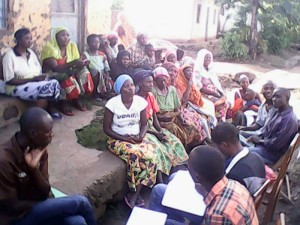 ‘In the beginning we actually wanted to harmonize all the hygiene education efforts used by the different NGOs and agencies to give them guidance and put in place a full policy that had not existed up until then.’
‘In the beginning we actually wanted to harmonize all the hygiene education efforts used by the different NGOs and agencies to give them guidance and put in place a full policy that had not existed up until then.’
Sustainability
‘The many different hygiene education approaches were not reaching the community. There was no sense of sustainability. The CBEHPP brought a sense of sustainability to the efforts. It gave people the feeling that they themselves needed to solve their problems, not someone from the outside. It also gave them the confidence that they could solve their own problems, because they solved problems together when they were part of CBEHPP. They saw with their own eyes that it worked, and they wanted to do more.’
Training
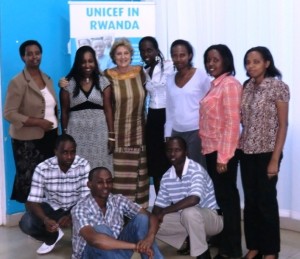
‘If you haven’t been exposed to this CBEHPP and CHC approach, you can’t know the goodness of it. It is a very good model. For instance, in the beginning, there is a “train the trainer” session. On the first day, beginning, you could see the people there were not “warm” to the idea, they were “cold.” But from the second day, and especially on the third to the fifth day, it is fire! Then they spread the fire. It is wonderful! In the end, they make their own planning for the training they will do when they go to the communities. They are so excited that they go back home singing and happy! It is so good to see this. I always want to do this.’
Scaling up
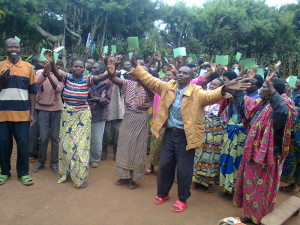 “First thing I thought that this program could be scaled up countrywide in a very short time because the program was so clear and focused. We wanted to set up community hygiene executive committees in all the districts in a very short time. So we spent a lot of time trying to educate the communities in the district about the importance of getting sanitation and hygiene first. Try to educate. Eventually, the district would agree and start program.”
“First thing I thought that this program could be scaled up countrywide in a very short time because the program was so clear and focused. We wanted to set up community hygiene executive committees in all the districts in a very short time. So we spent a lot of time trying to educate the communities in the district about the importance of getting sanitation and hygiene first. Try to educate. Eventually, the district would agree and start program.”
Sanitation
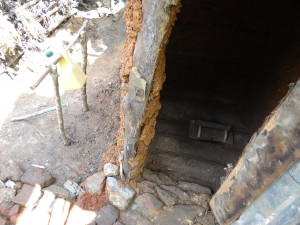 “When the CBEHPP communities started the implementation phase, they decided to first construct toilets for those who were the poorest households, those who were not capable of doing it for themselves. They would go and construct the toilets for them. They also put up kitchen gardens for them. Making sure that everyone in the community improved from this knowledge was important to them.”
“When the CBEHPP communities started the implementation phase, they decided to first construct toilets for those who were the poorest households, those who were not capable of doing it for themselves. They would go and construct the toilets for them. They also put up kitchen gardens for them. Making sure that everyone in the community improved from this knowledge was important to them.”
Income Generation
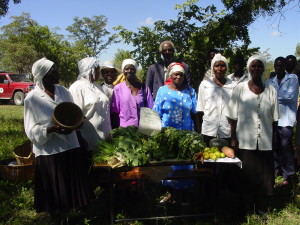 “After sanitation, the communities started thinking about income-generation activities that they could do together. They started contributing money so they could come up with income generation activities and make them happen. This really brought the communities together and benefited everyone, especially the women. Other NGO programs have studied the CBEHPP program. They have learned from this program and adopted this approach also.”
“After sanitation, the communities started thinking about income-generation activities that they could do together. They started contributing money so they could come up with income generation activities and make them happen. This really brought the communities together and benefited everyone, especially the women. Other NGO programs have studied the CBEHPP program. They have learned from this program and adopted this approach also.”
In the income-generating activities, they get prepared, they collect money, they open a bank account in the name of the CBEHPP group. Once the money saved is enough to start the income-generating project they have decided on together, we will try to help them. We will help them come up with ideas about implementing their activities. They work together to make this a real thing. They learn together.
What has been the impact of the CHC/CBEHPP model?
 Wherever we have introduced CBEHPP, the community is doing well. Wherever we have not, they are demanding CBEHPP. As I said, we have had people from US visit a CBEHPP program, e.g. World Vision. They can tell you they were impressed. Water Aid, from the UK, also can give testimony.
Wherever we have introduced CBEHPP, the community is doing well. Wherever we have not, they are demanding CBEHPP. As I said, we have had people from US visit a CBEHPP program, e.g. World Vision. They can tell you they were impressed. Water Aid, from the UK, also can give testimony.
We think we have to put more effort to make CBEHPP happen all over our country. It has become a very well developed program. It makes people comfortable because it helps people understand they are free to talk about their hygiene problems and propose their own solutions. Every community member is very free to contribute.
Gender
How does the CHC/CBEHPP model help women in particular?
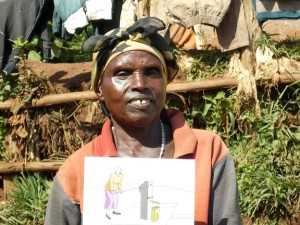 When we started, we didn’t want to say this program was for men or women. We said it was for the community. What came out in practice, however, was that the members of the CBEHPPs were usually women. Women are the ones who benefit. This is a very supportive environment. The women are free to talk. They talk to each other. They learn confidence. They learn how to share their problems. They learn how to work together to make solutions. This helps them in the program and in other places. They don’t have many other places in which to experience this. This also is very important for the benefit of the entire community to have more confident, stronger women.
When we started, we didn’t want to say this program was for men or women. We said it was for the community. What came out in practice, however, was that the members of the CBEHPPs were usually women. Women are the ones who benefit. This is a very supportive environment. The women are free to talk. They talk to each other. They learn confidence. They learn how to share their problems. They learn how to work together to make solutions. This helps them in the program and in other places. They don’t have many other places in which to experience this. This also is very important for the benefit of the entire community to have more confident, stronger women.
Women are much more confident about their own abilities and what they can do after participating in the program. They feel supported. They know they have done things together that prove they are capable of doing more.
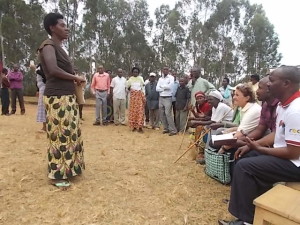 When we reach there, I don’t have words to express this. They are so happy with the clubs, very happy, very happy when leaders visit them. You can’t imagine. They are ready to show you what they have done, people they have helped. They are proud of their own work. They come up with lots of ideas about what to do next. This program gives them the time to think, provide their ideas and work with each other. It changes everything for these women.
When we reach there, I don’t have words to express this. They are so happy with the clubs, very happy, very happy when leaders visit them. You can’t imagine. They are ready to show you what they have done, people they have helped. They are proud of their own work. They come up with lots of ideas about what to do next. This program gives them the time to think, provide their ideas and work with each other. It changes everything for these women.
They say “it help us to open us more.” They feel comfortable. The more they feel comfortable, they more they decide to do more things, and the more they accomplish.
Do the women stay connected with the CHCs?
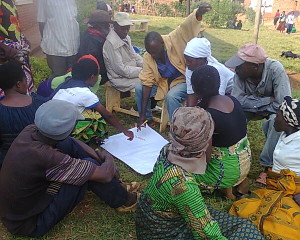 This always is something they will be part of. They just will do different activities when they are together. Hygiene and sanitation have to be done quite continuously. If they start with traditional pit latrines, they now have the capacity to build VIP latrines. They are able to cement them for easy cleaning, and they understand how important that is. Change comes slowly. They first come to know the importance of VIP latrines and of cementing it. Then they use the capacity they gain to do other things together. Once they get the capacity, they use it, and they never stop. We help them get the capacity for themselves. It makes my heart proud. It is the most exciting thing I can do.
This always is something they will be part of. They just will do different activities when they are together. Hygiene and sanitation have to be done quite continuously. If they start with traditional pit latrines, they now have the capacity to build VIP latrines. They are able to cement them for easy cleaning, and they understand how important that is. Change comes slowly. They first come to know the importance of VIP latrines and of cementing it. Then they use the capacity they gain to do other things together. Once they get the capacity, they use it, and they never stop. We help them get the capacity for themselves. It makes my heart proud. It is the most exciting thing I can do.
What about girls and CHCs?
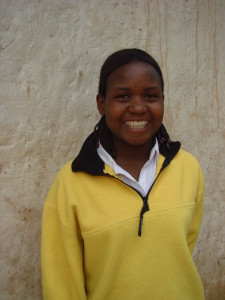 Sometimes I go to a village and just listen to how they are discussing. Mothers bring their daughters to listen also and see what can be done. What I can’t believe is to see their enthusiasm. If someone has provided an idea, to see how are others helping to build up that idea. Don’t expect people to speak harsh words to others in this program. They have very good discussions together. The girls come with their mothers. Mothers pass knowledge to daughters and daughters help mothers to learn new ways. The daughters become stronger and the mothers become prouder of their daughters and want to do more with them.
Sometimes I go to a village and just listen to how they are discussing. Mothers bring their daughters to listen also and see what can be done. What I can’t believe is to see their enthusiasm. If someone has provided an idea, to see how are others helping to build up that idea. Don’t expect people to speak harsh words to others in this program. They have very good discussions together. The girls come with their mothers. Mothers pass knowledge to daughters and daughters help mothers to learn new ways. The daughters become stronger and the mothers become prouder of their daughters and want to do more with them.
What about students?
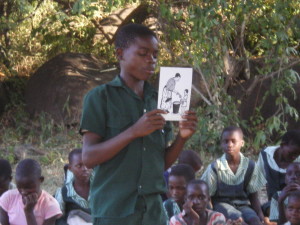
Children must be given time to discuss at school, just like the communities. Children will bring experiences from their homes, discuss them at schools and make decisions. I want to start with primary schools because primary schools are where the change starts. But we need to keep the conversations going all throughout school. Girls after primary school need to learn and discuss about menstrual health for example. It is very important to keep them in school. Our program, if we could expand it, could be a very good way to help them learn the best ways and share with each other to make change they practice forever.
